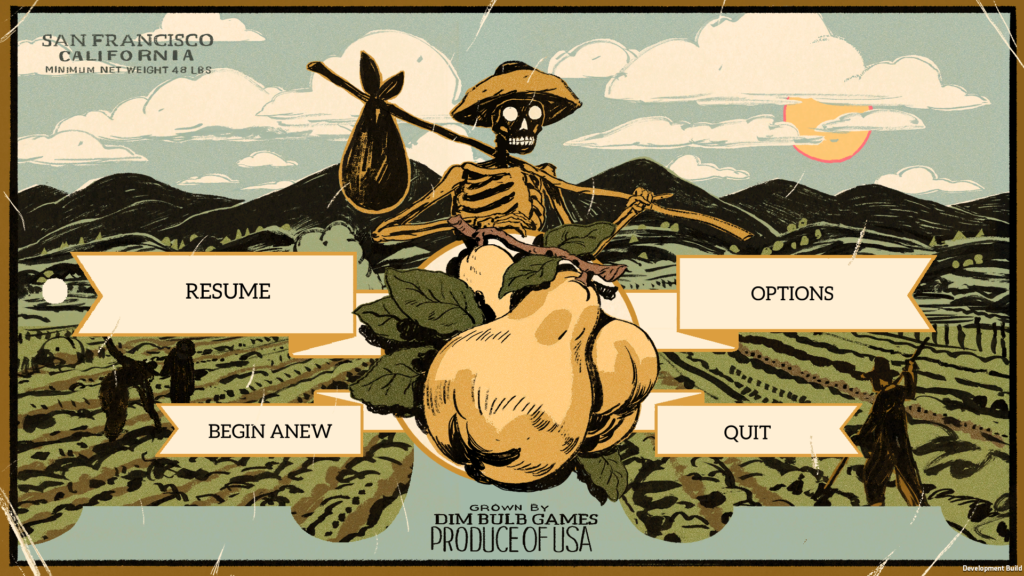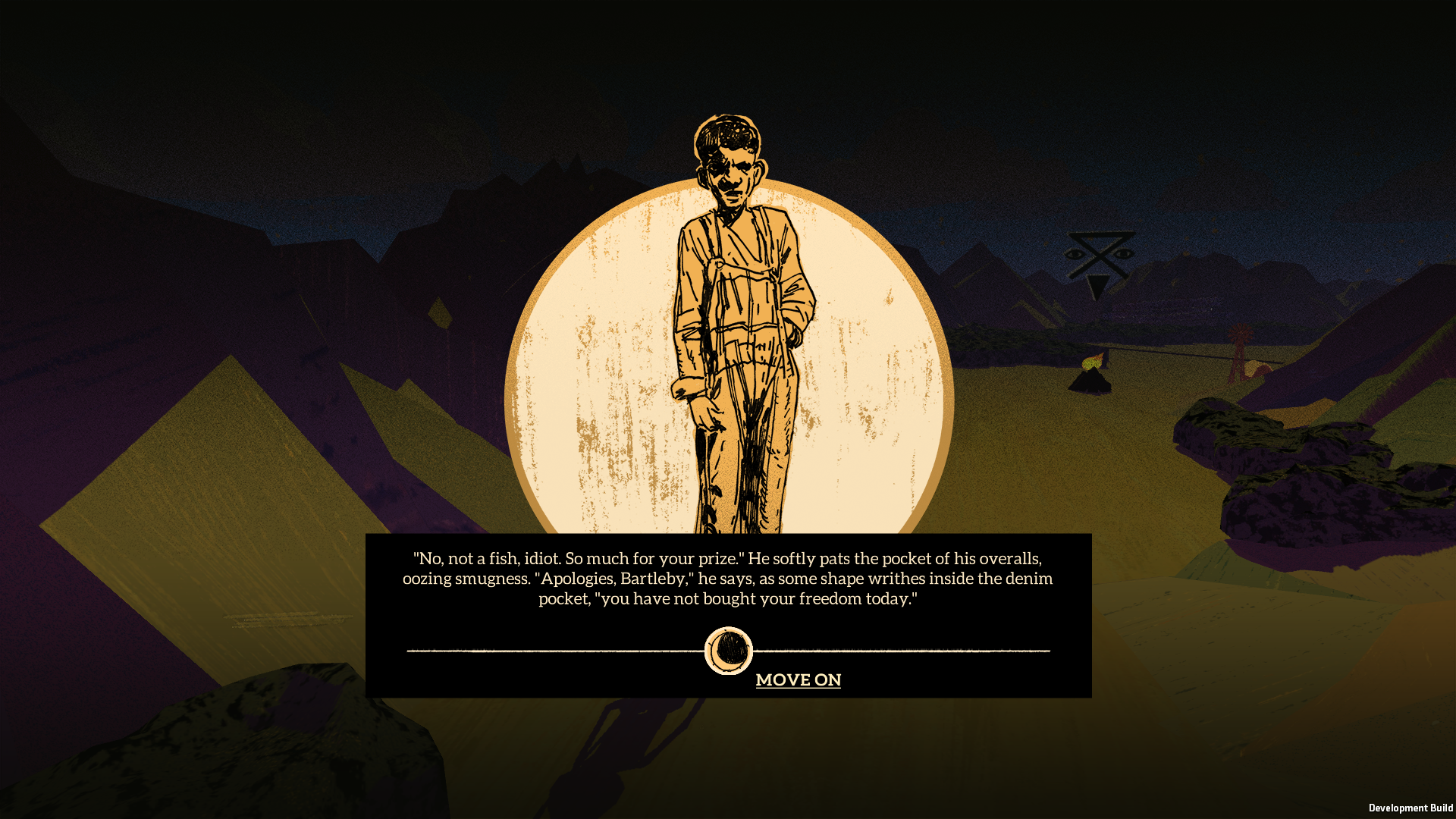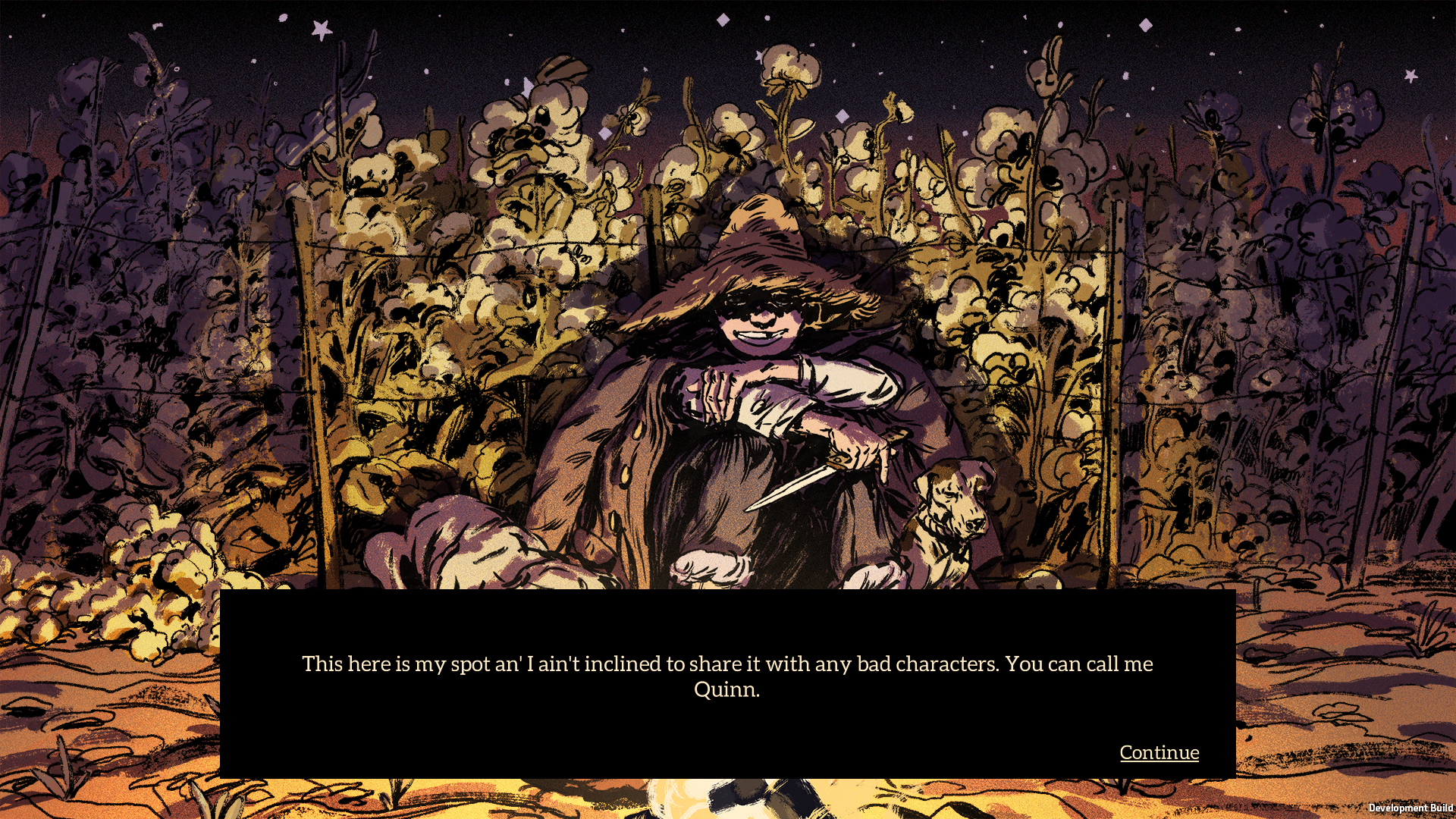
Provided by Dim Bulb Games
The ‘big lie’ of the American Dream in Where the Water Tastes like Wine
Trigger warning: discussion of racism, ethnic cleansing, xenophobia, war, and PTSD.
The sun hung low in the sky across the southwestern horizon. I’d been walking for what felt like an eternity by that point, cursed to wander across this ever-expanding nation gathering and spreading stories. Along the way, as I arduously made my way from city to city, having met hundreds of people, and witnessed a thousand and one stories, I found America. Not the bountiful utopia people like to pretend it is, but the real America— the one built on the backs of the poor, the demeaned and the disenfranchised, who helped build a country that was never meant for them.
Where the Water Tastes like Wine is a narrative-driven adventure game that calls itself a “bleak American folk tale about travelling, sharing stories, and surviving manifest destiny.” It takes place in what initially presents itself as the Great Depression-era United States with a healthy dose of magical realism mixed in. But you later come to realize it’s actually a pastiche of the American mythos spanning from the middle of the 19th century to roundabouts the late 1960’s. You play as the personification of Folklore, a giant walking skeleton, who has been cursed to find and spread stories across the land after being swindled in a backroom card game by a man with wolf’s head and Sting’s voice. Before you head off on your journey, the Dire Wolf shares a few words, namely that “this land is built on stories. Few of the small ones are strictly true, and the big story is mostly a lie,” and the “more important stories are the true ones. Those often get lost in the weaves of the big story.”

The “big story” he’s referring to is the American Dream, the national ethos of the United States, which declares that all men are created equal and have the opportunity to succeed regardless of the circumstances of their birth. It has its root in the Declaration of Independence, a declaration whose statements of equality were betrayed by the very men that had penned them..
WTWTLW seeks to unravel the story of the United States then lay bare the pain and sadness at its heart. The main mechanic of the game consists of finding stories, usually little more than oddities of the road, then spreading them as far as possible until they become the fables and folktales undergirding the country’s mythology. These stories are told through beautifully illustrated vignettes resembling the pictures one would find in a classic adventure story. The stories eventually become like trading cards because you share them with other travelers in exchange for their own stories.

The first story I came upon was one where two women’s house was being ransacked by police looking for bootleg alcohol. I started sharing the story on my travels and after a while, it morphed into the story of Gwen Pichet, the most famous bootlegger in American history. Road stories are like that, growing and ever changing but with a little kernel of truth to them. Paul Bunyan? He was just an incredibly strong lumberjack, but after a few journeys from coast to coast, he had become a gigantic man accompanied by a blue ox. Johnny Appleseed? Just a man travelling the country dropping seeds who eventually became a folk hero to the people of the Midwest.
The most important stories you find while travelling are the stories of your fellow wanderers, the “true stories” that tend to get lost in the “big story” of the nation. These travelers are a lot like you, caught in different forms of bondage and continually searching for freedom. They’re also historically disenfranchised in the US: the poor, LGBTQ+ people, people of color, migrant workers. Many of them are hopeful they’ll find everything they’re looking for in the American Dream, while others are explicitly trapped because of the racism and violence implicit in the foundation of the United States. The theme of a good half of them is that the characters are rapidly approaching the “end of an era.” Some view the future as filled with hope, while others know that it only promises more pain.
Fidelina and Dehaaya’s stories express the sorrow of seeing their culture and people erased by the encroachment of white America and the incredible violence it comes with. Fidelina is a Mexican curandera, who uses traditional folk medicine to heal others. Dehaaya is Navajo, forced out of her homeland during the “Long Walk to Bosque Redondo,” an attempted ethnic cleansing of Indigenous people by the US government. Both women travel the American Southwest, hoping to pass on their traditions, folklore, and culture to the next generation so they don’t die with them. Dehaaya is a little hopeful, but Fidelina is decidedly less so because she knows it’s only a matter of time until her culture is dead.

Shaw’s story is the most impactful one I stumbled upon. He’s a black sharecropper who travels up and down the Midwest hoping to gather enough money to establish his own farm, where he can live free from racism and abusive bosses. Like many black men during the Reconstruction and the Great Depression, Shaw is thankful he was not born into slavery but knows his people aren’t truly free. He was born into a different type of imprisonment, one without bars. We sat together around a campfire in Wisconsin when he told me his people “don’t get the whip anymore… but [instead get] a boot in our backs.” The last time I met him, he asked me to send for him if I ever found the promised land.
Almost a century after this game is supposed to take place, people like these characters— people like me— are still fighting for equal rights and to preserve their culture. Thankfully, not every story is as depressing as the aforementioned, but there is always an undercurrent of pain and sadness to them even if they present themselves as stories of hope.
Franklin, a black Pullman porter, knows the times are changing for the better and knows that black people are coming together to form their own cohesive group with their own voice, culture, and traditions. He hopes he will eventually come to be viewed as a complex person instead of the many masks forced on him by white people. Little Ben’s and Rocio’s stories are similar. They represent miners and farm workers, respectively, coming together to form workers’ unions to win the respect and acknowledgement of the society that wanted to grind them into dust.

These are only 6 of the 16 main stories in the game, but they all follow the same theme and motif: being trapped in bondage and seeking freedom. The game ends after you’ve met each of your fellow travelers and heard their stories to completion. You meet with the Dire Wolf again to share the stories of the forgotten Americans who built the nation. After hearing their stories, he comments on the sadness lying at their core and “perhaps that’s the real truth of this country, and the heart of the Big Lie.”
The stories of these characters show the pain and sadness at the center of the American Dream. People like Felinda and Dahaaya were violently killed or pushed away from their native homes to make way for white settlers. Meanwhile, people like Shaw, Franklin, Little Ben, and Rocio were the marginalized people whose hard work built the society we live in today. Stories like these are the ones “lost in the weaves of the big story,” pushed to the margins of history because they don’t fit into the “big lie” of the American Dream where everyone is treated equally no matter the circumstances of their birth. The truth is that the United States was never built to be equal. Instead, it was meant to put white men on top and push everyone else to the bottom. And we’re still fighting to change that.
I never did find the “place where the water tastes like the sweetest wine,” because it doesn’t exist. No matter how much you explore, how many people you meet, or the amount of stories you listen to and spread, the achievement Where the Water Tastes like Wine will forever remain out of reach. In an interview with Kotaku, lead designer Johnneman Nordhagen commented, “[o]ne of the big theme[sic] of WtWTLW is the idea that America promises a lot to its people, but fails that promise for most of them.” That’s the truth of it all. The American Dream was always fake, a “shining lie” always meant to hide the real “dingy and battered truth” of life in the United States.






I hope injecting popular mediums, like video games, with hard truths reaches a previously unexposed demographic.
Really liked the writing – the details were vivid. Almost as if I played the game myself! Thanks for sharing.